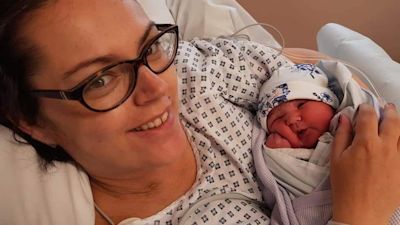'Miracles do happen': Teesside mum has daughter after being told she could not have children

A mother from Teesside has given birth after being told she could not have children after cancer treatment.
Ann Hope was told treatment would affect her fertility after being diagnosed with leukaemia.
Despite this, the Billingham woman defied all odds - even after a secondary infertility diagnosis in 2017 - and went on to conceive on her honeymoon.
She is now a proud mother to her beautiful daughter.
"We were devastated," said the 42-year-old. "It was a massive shock.
"You grieve when you're told you won't have any more children, especially if it was something you had planned in your life, but I carried on planning our wedding."
Mrs Hope got married in August 2017 and went on her honeymoon in October.
"When we got back I discovered that I was pregnant with my daughter Eden, who is now four-years-old," she said.
She is now telling her story as part of a new campaign to raise awareness of the symptoms of blood cancer.
"It is still quite hard to believe now. When it happens it's happiness and also fear in case anything goes wrong."
The mum advised: "If you have time, freeze your eggs. But, if like me, there is no time then have hope. The doctors aren't always right and miracles do happen.”
Mrs Hope realised that things were not quite right during Easter in 2016 when she was struggling to eat and barely got out of bed.
Her GP's initial reaction was that it was just an infection, but when a lump appeared in her neck she was sent for further testing.
After a tongue biopsy, Mrs Hope was diagnosed with acute myeloid leukaemia in May 2016.
"The next day, my Hickman line was inserted and the day after I started chemo, all in the space of four days," said Ann.
"My levels were so low that my Hickman line was just bleeding out, and after four days of chemo I was rushed to intensive care with liver failure and pneumonia.
"My partner was told to prepare for the worst as I was put on a continuous positive airway pressure machine to breathe for me. I spent a week in intensive care and came back onto the ward with oxygen."
While having treatment, Mrs Hope contracted an infection and also had kidney stones.
She said: "I am currently in remission but have been left disabled due to the treatment I received. I am unable to work now but I am alive."
The four most widely reported symptoms of blood cancer are:
Fatigue
Bruising
Unusual bleeding
Repeated infections
Other symptoms include night sweats, shortness of breath or joint pain.
Research revealed that only 1% of people surveyed in the North East were able to identify all four symptoms of leukaemia.
Almost 30 people are diagnosed with leukaemia every day in the UK and the overall survival rate stands at just over 50% - making it one of the most deadly forms of cancer.
A recent public survey by leukaemia charities Leukaemia UK and Leukaemia Care found that over that two fifths (40%) of respondents from the region could not recognise any of the four most widely reported symptoms of the disease.
Leukaemia charities in the UK have launched a new campaign to get people "parroting on" about the symptoms of Blood Cancer Awareness Month this September.
A new film released by Leukaemia Care and Leukaemia UK, have called on the expertise of ‘Henry’, a Macaw parrot, to try to make the symptoms of leukaemia memorable.
The ad sees Henry using a range of objects to create a catchy and repetitive ‘Spot Leukaemia rap’ featuring the symptoms of leukaemia.
People who are concerned about any of these symptoms - fatigue, bruising, unusual bleeding and repeated infections – are being strongly urged by the charities to contact their GP and request a blood test.
Listen to our latest podcasts to find out What You Need To know...